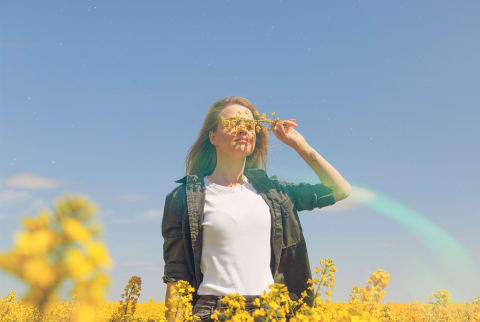The Fascinating Research On Why Women Might Be More Likely To Have "Bad Trips"


Does psilocybin affect women differently?
The answer is maybe. When researching the topic of challenging trips, I come across something interesting. An exploratory analysis found that challenging trip reports were more common in females. Although more research is needed, the analysis suggests that people assigned female at birth may experience psilocybin (even at similar doses) differently because of hormonal, enzymatic, and social differences.
Advertisement
We do know that estrogen levels impact binding at 5-HT2A receptor sites. In an article for Psychedelic Science Review, former editor and one of the founders of the publication Barbara E. Bauer, M.S., synthesized some of the research surrounding this receptor.
As a reminder, psilocybin and psilocin are 5-HT2A/5-HT1A receptor agonists. That means psilocybin binds to these serotonin receptors. Bauer notes that estrogen boosts the density of the brain's 5-HT2A binding sites, notably in areas that control mood and emotion. She further notes that other findings related to how hormones impact serotonin receptors may have implications for an entourage effect.
Do women have a unique entourage effect?
Psilocybin and psilocin are not the only compounds, or alkaloids, in magic mushrooms. And remember, nearly 200 different species of Psilocybe exist, some with multiple strains. Think of each of these as a different recipe with varying ingredients—or alkaloids.
Other magic mushroom alkaloids include norbaeocystin, baeocystin, norpsilocin, and aeruginascin. The theory of the entourage effect is that different compounds may work in concert to produce a certain result.
Research is still ongoing regarding the potential entourage effect with magic mushrooms and how we may be able to use it to our advantage. For example, is it possible that combining two strains produces a better trip? Again, more research is needed. What Bauer is pointing out is that sex hormones may play a role as well in how psilocybin affects us.
Does psilocybin impact the menstrual cycle?
Again, the answer is maybe. We don't have robust scientific research on this yet.
While researching topics related to women's health, I reach out to Natalie Gukasyan, M.D., at the Center for Psychedelic and Consciousness Research at Johns Hopkins University School of Medicine. My intent is to ask her about her work on psilocybin and eating disorders. That's when she tells me she's about to publish a case series on menstrual changes and psychedelics. She sends me the details via email, and I'm giddy over the fact that researchers are looking into this. In her case series, co-authored with Sasha K. Narayan, M.D., Gukasyan interviewed three women ages 27 to 34 about their cycles after psychedelic use. Two of the women used psilocybin, so I will focus on their reports.
The first is a 27-year-old with premenstrual dysphoric disorder (PMDD) who ingested around 1.5 grams of dried psilocybin mushrooms when she was 26. Her period came eight days early. And she noted worse-than-usual cramps and mood swings. Later, the woman microdosed psilocybin and noted a benefit to functioning in the face of her PMDD symptoms, though she did not experience symptom improvement.
Another woman featured in the case series, now 31, was 28 when she ingested chocolate that contained psilocybin and a component of ayahuasca, another psychedelic. This woman had experienced amenorrhea (an absence of a period) for five years. The morning after consuming the psychedelics, her period arrived, and she experienced normal cycles for the next three months before noticing some irregularity again.
A year later, she was diagnosed with polycystic ovarian syndrome (PCOS). Menstrual irregularity is a common symptom of the condition. She used classic psychedelics again at least a dozen times at moderate to high doses and reported that a third of those instances likely influenced the early arrival of her period. After her PCOS diagnosis, she also reported microdosing magic mushrooms and that while doing so she experienced menstrual regularity.
Excerpted from The Psilocybin Handbook for Women by Jennifer Chesak. Copyright © 2023 Ulysses Press. Reprinted with permission from Ulysses Press. New York, New York. All rights reserved.
Advertisement

Jennifer Chesak is the author of The Psilocybin Handbook for Women: How Magic Mushrooms, Psychedelic Therapy, and Microdosing Can Benefit Your Mental, Physical, and Spiritual Health. She is a Nashville-based freelance journalist, editor, fact-checker, and adjunct professor with two decades of experience and a Master of Science in Journalism from Northwestern University's Medill. Her byline appears in several national publications, including the Washington Post. Follow her on socials @jenchesak.